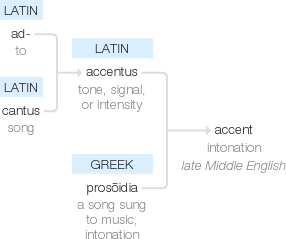Accent
late Middle English (in the sense ‘intonation’): from Latin accentus ‘tone, signal, or intensity’ (from ad- ‘to’ + cantus ‘song’), translating Greek prosōidia ‘a song sung to music, intonation’.
wiktionary
From Middle English accent, from Middle French accent, from Old French acent, from Latin accentus, past participle of accinō(“sing to, sing along”). The word accent had been borrowed into Old English already, but was lost and reborrowed in Middle English.
From Middle French accenter, from Old French accenter, from Latin accentō, from accentus.
etymonline
accent (n.)
late 14c., "particular mode of pronunciation," from Old French acent "accent" (13c.), from Latin accentus "song added to speech," from ad "to" (see ad-) + cantus "a singing," past participle of canere "to sing" (from PIE root *kan- "to sing").
The Latin word was a loan-translation of Greek prosōidia, from pros- "to" + ōidē "song," which apparently described the pitch scheme in Greek verse. Meaning "effort in utterance making one syllable stronger than another in pitch or stress" is from 1580s; as "mark or character used in writing to indicate accent," 1590s. The decorative-arts sense of "something that emphasizes or highlights" is from 1972.
accent (v.)
"to pronounce with accent or stress," 1520s, from French accenter, from Old French acenter "accentuate, stress," from acent (see accent (n.)). Meaning "mark with an accent sign" is from 1660s (implied in accented); figurative sense "mark emphatically" is from 1650s. Related: Accenting.
